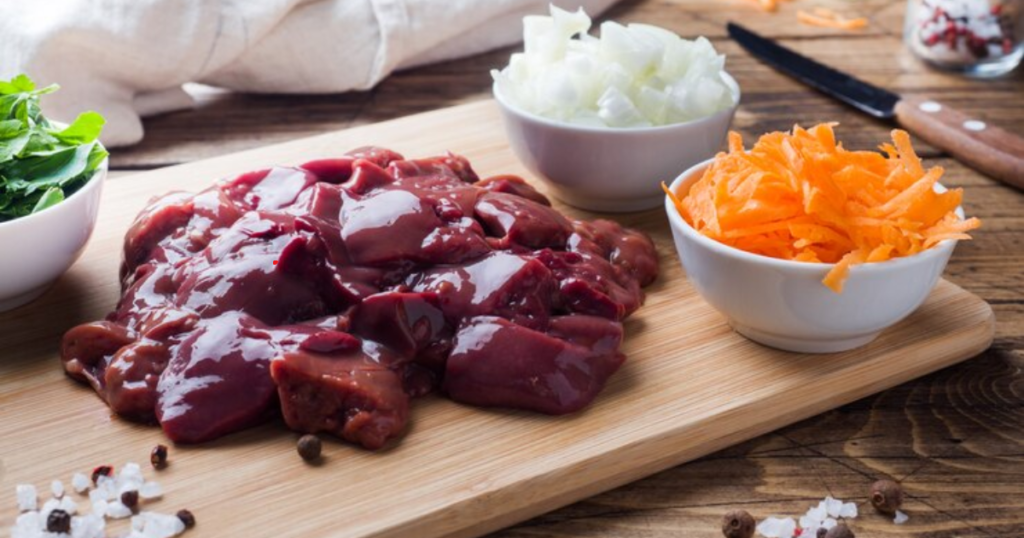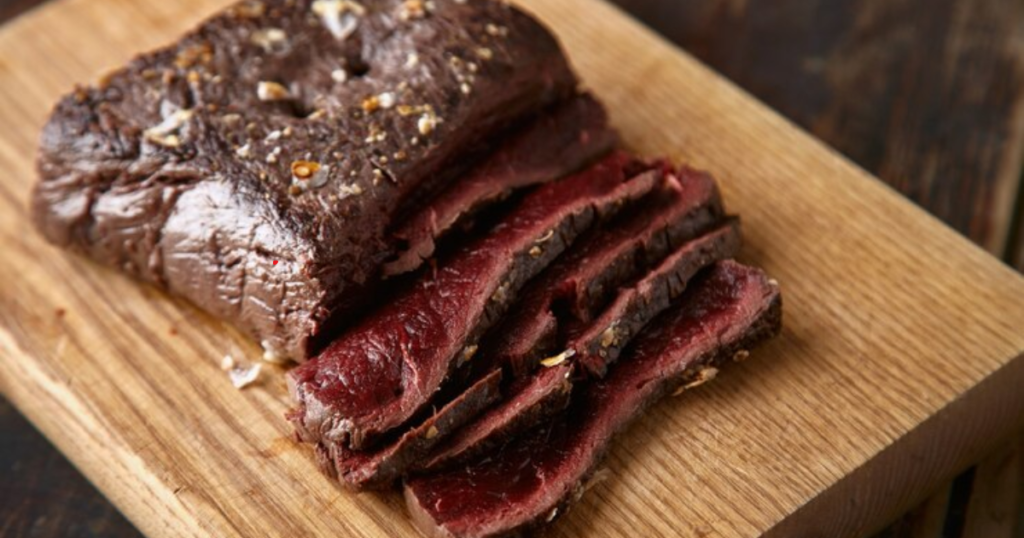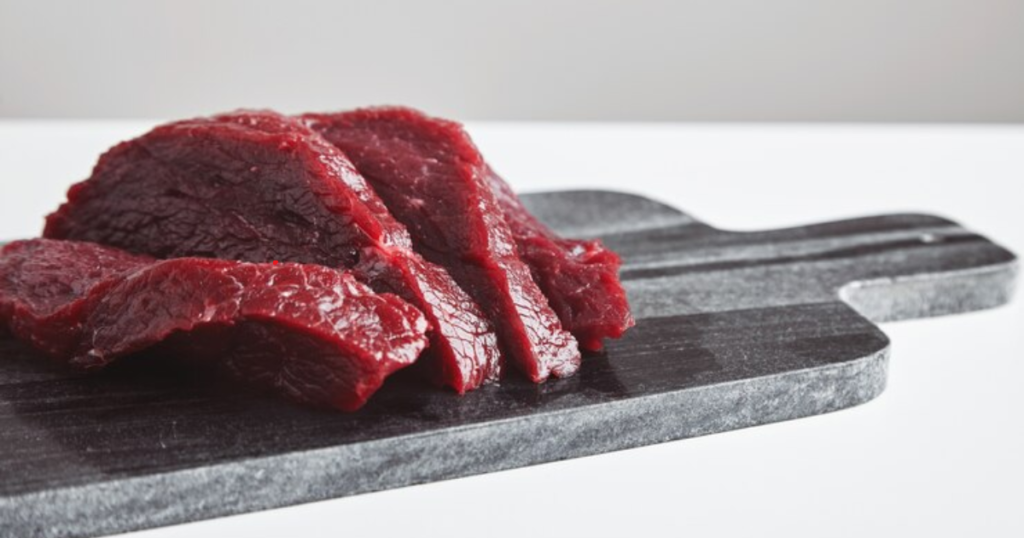When you want a quick snack, beef jerky is a tasty choice that’s easy to grab. But does eating beef jerky help you in weight loss? Let’s explore to see if it’s true.
Different Types of Jerky for Weight Loss
Jerky can be a quick and protein-rich snack that can help you lose weight, as long as you choose the correct type and take it moderately. Here are a few types of jerky that can help you lose weight:
- Beef Jerky: Traditional beef jerky is strong in protein and might help you feel fuller for longer. To stay healthy, choose foods with less added sugars and low sodium.
- Turkey Jerky: While lower in fat and calories than beef jerky, turkey jerky is nonetheless high in protein.
- Chicken Jerky: Chicken jerky, like turkey jerky, is a lean protein source with fewer calories and fat, making it an excellent choice for weight loss.
- Bison Jerky: Bison jerky is leaner than beef and can be a high-protein, low-fat snack.
- Pork Jerky: Fat content varies, so search for lean cuts with less added sweeteners.
- Fish Jerky: Salmon jerky and tuna jerky are high in omega-3 fatty acids, which can help with heart health while also delivering a protein boost.
- Vegan Jerky: Made from soy, mushrooms, or jackfruit, vegan jerky can be a low-calorie plant-based protein source. It is critical to review the ingredient list for additional sugars and preservatives.

Nutritional Profile of Beef Jerky
Beef jerky is known for its high protein content, making it a popular choice among fitness fanatics. A average portion provides approximately 10 grams of protein, which is plenty for a snack. Additionally, beef jerky is low in fat and carbs, making it a nutrient-dense alternative that can help with a variety of dietary goals. It also contains essential vitamins and minerals like zinc and iron, which add to its nutritious worth.
Health Benefits of Beef Jerky
1. Protein and Weight Loss
One of the most notable advantages of beef jerky is its protein content. Protein is believed to increase satiety, allowing you to feel fuller for longer. This can be really useful when attempting to reduce calories without feeling always hungry.
Furthermore, protein helps to preserve muscle mass during a calorie deficit, ensuring that the weight you lose is predominantly fat rather than muscle.
Another advantage of protein is that it has a higher thermic impact than fats or carbohydrates, which means your body burns more calories digesting it.
2. Low-Carb Benefits
Beef jerky can be an excellent complement to a low-carb or ketogenic eating plan. It helps to reduce insulin spikes, which can improve blood sugar regulation and fat burning. Unlike high-carb snacks, beef jerky does not induce a sudden rise in blood sugar levels, making it a more stable alternative for sustaining energy and minimizing cravings.
3. Portion Control
While beef jerky is healthful, it is critical to maintain portion control. It’s easy to overeat this delightful snack, which might contribute to a calorie surplus. A normal serving size is about one ounce, which is about equivalent to a tiny handful.
Mindful eating strategies, such as enjoying each bite and avoiding eating directly from the bag, can help manage portion sizes more successfully.
4. Convenience and Portability
One of the most significant advantages of beef jerky is its convenience. It is a non-perishable, portable snack that may be readily stored in a gym bag, desk drawer, or automobile.
Compared to other easy snacks such as chips or candy bars, beef jerky is a protein-rich option that helps in weight loss. It’s a perfect snack for folks who lead hectic lives and want to keep their energy levels up throughout the day.
5. Satiety and Snacking
Beef jerky’s high protein content makes it especially effective in satisfying hunger between meals. Consuming it as a mid-morning or mid-afternoon snack will help manage your appetite and lower your chances of overeating at larger meals.
By eating beef jerky at appropriate moments, you may keep a more regular daily calorie consumption, which will help your weight loss attempts.
6. Variety and Flavor Options
The diversity of flavors available for beef jerky might make it an appealing snack option. However, it is critical to find healthy alternatives. Some flavored jerky may be heavy in sugar or artificial ingredients.
To get the most health advantages, choose natural or lightly seasoned alternatives. Avoid high-sugar options, which can add extra calories and potentially impede weight loss.
7. Homemade vs. Store-Bought
Making your own beef jerky at home can be a healthier alternative to pre-packaged versions. This gives you more control over the components and eliminates preservatives and extra sodium.
Homemade beef jerky recipes can be tailored to your own flavor preferences and nutritional requirements. Furthermore, it’s a fun and satisfying culinary project with tasty outcomes.

Potential Drawbacks
Beef jerky can be a popular snack option, because to its high protein content and simplicity. However, there are some potential downsides to consider if you’re looking to lose weight.
- High sodium content: Beef jerky is frequently extensively salted during the curing process in order to preserve it. This might lead to increased sodium intake, which can cause water retention and bloating, compromising your weight loss goals.
- Calorie Density: Beef jerky can be high in calories, despite its protein content. Consuming big amounts without considering portion sizes might result in excessive calorie intake, thwarting weight control efforts.
- Processed Additives: Commercial beef jerky may contain preservatives, taste enhancers, and sugar. These can increase calories and potentially jeopardize your dietary goals.
- Satiation: While protein is generally filling, the texture and convenience of use of beef jerky may not deliver the same level of satiety as complete foods. If portions are not kept under check, this might lead to overconsumption.
- Cost and Availability: Quality beef jerky can be more expensive than other protein sources. Depending on where you reside, it may not always be easily accessible or economical.
To address these issues, consider using leaner cuts of beef jerky with lower sodium content or manufacturing handmade versions with more control over the components.

How to Include Beef Jerky in Your Diet as a Healthy Snack
Including beef jerky in your diet as a healthy snack is possible with some mindful choices and moderation. Here are some tips to help you do that:
1. Choose High-Quality Beef Jerky
- Ingredients: Look for jerky with minimal ingredients. Ideally, it should contain beef, salt, and spices, without added sugars, preservatives, or artificial ingredients.
- Sodium Content: Opt for low-sodium varieties to keep your salt intake in check.
- Nitrate/Nitrite-Free: Choose products that do not use nitrates or nitrites as preservatives.
2. Watch Portion Sizes
- Serving Size: Stick to the recommended serving size on the packaging. Typically, a serving size is around 1 ounce (28 grams).
- Calorie Count: Keep track of the calories to ensure you’re not consuming too much in one sitting.
3. Pair with Nutrient-Rich Foods
- Vegetables: Combine beef jerky with fresh veggies like carrot sticks, cucumber slices, or cherry tomatoes for added fiber and nutrients.
- Fruits: Pair it with fruits like apple slices or grapes for a balance of protein and carbohydrates.
- Nuts and Seeds: Add a handful of nuts or seeds for healthy fats and extra protein.
4. Use as Part of a Balanced Diet
- Meal Planning: Incorporate beef jerky into your snack rotation, not as a daily staple but as an occasional treat.
- Balanced Meals: Ensure your overall diet includes a variety of foods from all food groups, such as fruits, vegetables, whole grains, lean proteins, and healthy fats.
5. Stay Hydrated
- Drink Water: Beef jerky is high in protein, which can make you thirsty. Drink plenty of water throughout the day to stay hydrated.
6. Consider Homemade Options
- Homemade Jerky: Making your own beef jerky allows you to control the ingredients and seasoning. You can use lean cuts of beef, natural spices, and minimal salt.
Read More: Can Linzess Cause Weight Loss? 2024
Conclusion
To sum up, beef jerky can be a good snack for losing weight if you eat it carefully and have it with other healthy foods. It has lots of protein, is easy to carry around, and can stop you feeling hungry, which all help when you’re trying to lose weight. But you should pick the healthier kinds and not eat too much at once to avoid any problems. If you use it right, beef jerky can help you reach your weight loss goals and keep you going strong.
People Also Ask
What is beef jerky, and can it help you in weight loss?
Beef jerky is a high-protein, dried and cured meat product. Protein helps you feel fuller for longer, so eating beef jerky as a snack may satisfy your hunger and keep you from overeating. However, it is critical to limit portion sizes and select jerky with reduced sodium and fat content.
Does beef jerky have a lot of calories?
Beef jerky can be high in calories due to its concentrated meat content. While it is a healthy source of protein, eating too much can be calorie-dense. To assist you lose weight, choose leaner cuts and limit your serving sizes.
Can beef jerky help build muscle and burn fat?
Protein in beef jerky promotes muscle growth, and preserving muscular mass can help you burn more calories. It’s a convenient snack for active people, but it should be part of a well-balanced diet that includes fruits, vegetables, and whole grains for optimal health and weight management.
Is beef jerky a healthy snack for weight loss?
Beef jerky can be consumed in moderation as part of a weight loss plan. It is low in carbohydrates and contains vital elements such as iron and zinc. Choosing variants with less salt and avoiding those with extra sugars or bad fats is essential for making it a healthier snack choice.
Are there any drawbacks to eating beef jerky while trying for weight loss?
Some beef jerky products have high levels of sodium and preservatives, which may not be suitable for everyone, particularly those with specific health concerns. To choose a healthier snack decision, check labels and select brands with reduced sodium and fewer additives.









Leave a Reply